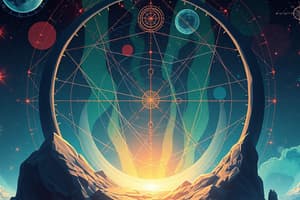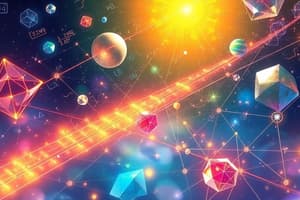Podcast
Questions and Answers
Which branch of mathematics primarily focuses on numbers and basic operations?
Which branch of mathematics primarily focuses on numbers and basic operations?
- Geometry
- Algebra
- Calculus
- Arithmetic (correct)
Which branch of mathematics deals with shapes, sizes, and spatial relationships?
Which branch of mathematics deals with shapes, sizes, and spatial relationships?
- Geometry (correct)
- Discrete Mathematics
- Statistics
- Algebra
What is the primary purpose of proofs in mathematics?
What is the primary purpose of proofs in mathematics?
- To establish the truth of mathematical statements (correct)
- To provide visual representations
- To solve algebraic equations
- To simplify calculations
Which mathematical area deals with the study of variables and equations?
Which mathematical area deals with the study of variables and equations?
In which branch of mathematics would you study derivatives and integrals?
In which branch of mathematics would you study derivatives and integrals?
Which of the following is a key application of mathematics in the social sciences?
Which of the following is a key application of mathematics in the social sciences?
What type of mathematical structures does discrete mathematics focus on?
What type of mathematical structures does discrete mathematics focus on?
Which area of mathematics is vital for understanding economic trends and market behavior?
Which area of mathematics is vital for understanding economic trends and market behavior?
Flashcards
What is arithmetic?
What is arithmetic?
The fundamental branch of mathematics that studies numbers, basic operations like addition, subtraction, multiplication, and division, and their properties. This is the foundation for understanding more advanced mathematical concepts.
What is algebra?
What is algebra?
This branch of mathematics focuses on variables and equations, exploring relationships between quantities and solving for unknowns. It involves concepts like polynomials, linear equations, and systems of equations.
What is geometry?
What is geometry?
This is the study of shapes, sizes, and positions of objects in space. It includes concepts like points, lines, angles, polygons, and both Euclidean and non-Euclidean geometry.
What is calculus?
What is calculus?
Signup and view all the flashcards
What is discrete mathematics?
What is discrete mathematics?
Signup and view all the flashcards
What are sets?
What are sets?
Signup and view all the flashcards
What are functions?
What are functions?
Signup and view all the flashcards
What is logic?
What is logic?
Signup and view all the flashcards
Study Notes
General Information
- Mathematics encompasses a vast field of study concerning abstract concepts like quantity, structure, space, and change.
- It employs logical reasoning and abstract thought to formulate and prove theorems and solve problems.
- Various branches exist like arithmetic, algebra, geometry, calculus, and more, each with its own concepts and applications.
Key Areas of Study in Mathematics
- Arithmetic: The fundamental branch dealing with numbers, operations (addition, subtraction, multiplication, division), and properties of numbers.
- Algebra: Focuses on variables and equations, exploring relationships between quantities and solving unknowns. This includes concepts like polynomials, linear equations, and systems of equations.
- Geometry: Studies shapes, sizes, and positions of objects in space, including points, lines, angles, and polygons. It encompasses Euclidean geometry and non-Euclidean geometry.
- Calculus: Deals with change and motion, including concepts like derivatives, integrals, limits, and applications to problems in physics and engineering.
- Discrete Mathematics: Studies mathematical structures that are not continuous, such as graphs, logic, and counting principles; this is applicable to computer science and related fields
Core Mathematical Concepts
- Sets: Collections of objects, often with specific properties, forming the foundation for many mathematical structures.
- Functions: Relationships between sets, where each element of the first set corresponds to one or more elements in the second set.
- Logic: A formal system of reasoning using statements and connectives, used to both establish and validate arguments.
- Proofs: Techniques used to establish the truth of mathematical statements.
Applications of Mathematics
- Science and Engineering: Mathematics provides fundamental tools for modeling phenomena, predicting outcomes, and designing solutions in various scientific and engineering disciplines.
- Computer Science: Algorithms, data structures, cryptography, and other computer science concepts heavily rely on mathematical foundations.
- Economics and Finance: Mathematical modeling and analysis are vital for understanding economic trends, market behavior, and financial instruments.
- Social Sciences: Statistical methods and mathematical models play important roles in analyzing data and understanding social phenomena.
Studying That Suits You
Use AI to generate personalized quizzes and flashcards to suit your learning preferences.




